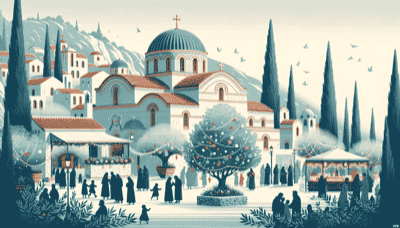We're here to help you keep count of the days to or since a date. Just click the button below and enter your chosen date to get started. Also choose the suggested days or search for a special day above #countingthedays

Christmas Day in Greece, known as "Christougenna" (Χριστούγεννα), is celebrated on December 25th and is a time of festive joy and family gatherings. The day marks the birth of Jesus Christ and is a public holiday across the country.
The Greek Orthodox Church plays a significant role in the celebration of Christmas, with many religious customs intertwined with the festivities. Unlike some Western traditions where Santa Claus is prominent, Greeks often focus more on Saint Basil (Agios Vasilis), who brings gifts to children on January 1st, his feast day.
Leading up to Christmas Day, Greeks fast for 40 days, abstaining from meat and dairy. This period is called "Sarakosti." Traditional decorations include boats instead of trees in some regions, symbolizing Saint Nicholas’s role as the protector of sailors. However, Christmas trees have also become popular.
Midnight Mass: Many Greeks attend church services on Christmas Eve or Christmas morning.
Feasting: After fasting, families enjoy a feast that often includes foods such as roast lamb or pork, various pies, and special bread called "Christopsomo" (Christ's bread).
Caroling (Kalanda): Children sing carols ("kalanda") with triangles and drums going door to door on Christmas Eve.
Home Decoration: Homes are decorated with nativity scenes depicting the birth of Jesus Christ.
Exchange of Gifts: While gift-giving traditionally occurs on January 1st for Saint Basil's day, many now also exchange gifts on Christmas Day.
On this day, public life slows down significantly as businesses and government offices close so that everyone can spend time with their loved ones.